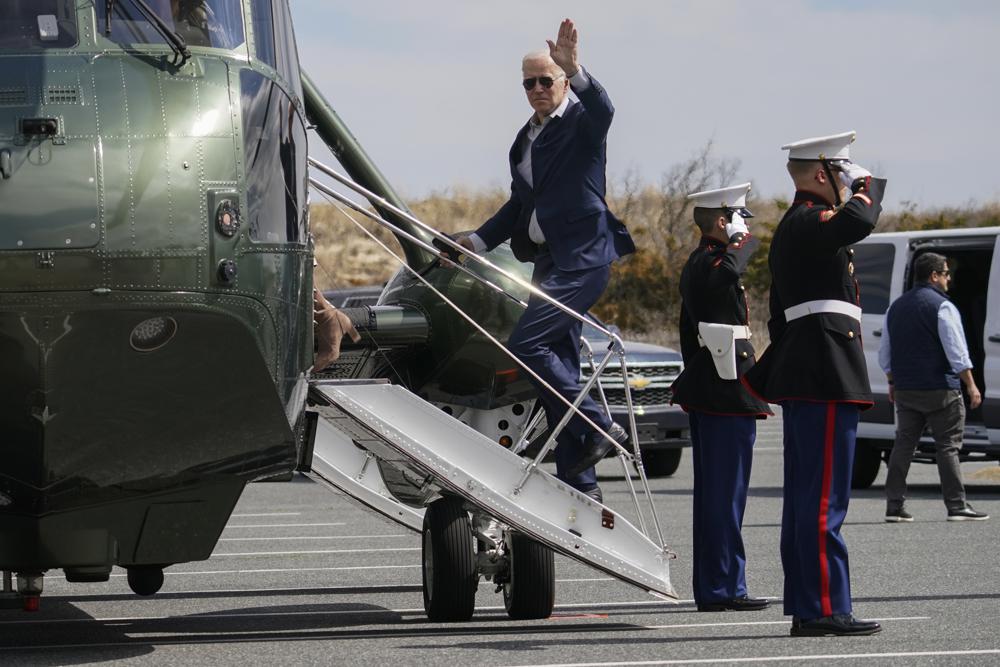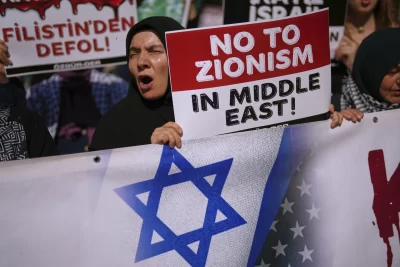
WASHINGTON — President Joe Biden will thank Poland’s president for the country’s efforts to shelter Ukrainian refugees as part of his trip this week to Europe as Russian forces bear down in a nearly-month old invasion.
Poland is a crucial ally in the Ukraine crisis. It is hosting thousands of American troops and is taking in more people fleeing the war in Ukraine — more than 2 million — than any other nation in the midst of the largest European refugee crisis in decades.
Biden will head to Warsaw for a bilateral meeting with President Andrzej Duda scheduled for Saturday. Biden will discuss how the U.S., along with its allies and partners, is responding to the humanitarian and human rights crisis that Russia’s unjustified and unprovoked war on Ukraine has created. It’s possible, too, that the president will visit a refugee camp.
Poland is “an important partner as we work to remain unified in the weeks and months ahead,” White House press secretary Jen Psaki said Monday.
Biden added the stop to his critical trip to Brussels this week for urgent talks with NATO and European allies. On Monday, European leaders of France, Germany, Italy and the United Kingdom spoke for about an hour, discussing “Russia’s brutal tactics in Ukraine, including its attacks on civilians, the White House said. They also reviewed recent diplomatic efforts in support of Ukraine’s effort to reach a ceasefire. Psaki said she though the leaders would continue to be in touch routinely on the conflict.
She said the White House also remained in touch with Ukrainian officials.
”We convey we support any diplomatic effort,” but the role the U.S. can play is through a broad range of military assistance and economic sanctions levied against Russia, she said.
Biden will not travel to Ukraine. “We have not explored that option,” Psaki said. Aside from the massive security concerns sending Biden into a warzone, the president felt he could make a more “effective and impactful” trip by meeting with other NATO leaders on how to help Ukraine.
Secretary of State Antony Blinken, while in Poland this month, briefly crossed into neighboring Ukraine in a show of solidarity alongside that country’s foreign minister, Dmytro Kuleba. Poland has been one of the most vocal countries in asking fellow NATO members to consider getting more involved to rein in the bloodshed.
Russian President Vladimir Putin’s invasion of Ukraine largely has united the U.S. and NATO and European allies, as well as allies in Asia and elsewhere. The United States and European governments see Moscow’s military aggression as a threat to their security and strategic interests.
Biden and NATO have said repeatedly that while the U.S. and NATO will provide weapons and other defensive support to non-NATO member Ukraine, they are determined to avoid any escalation on behalf of Kyiv that risks a broader war with Russia.
The Pentagon on March 9 rejected a Polish proposal for providing Ukraine with MiG fighter jets via a NATO air base, saying allied efforts against the Russian invasion should focus on more useful weaponry and that the MiG transfer with a U.S. and NATO connection would run a “high risk” of escalating the war.
Ukraine’s president, Volodymyr Zelenskyy, has pleaded for the U.S. to provide his military with more aircraft and advanced air-defense systems. NATO and the United States have rejected his appeals to establish a “no-fly zone” over Ukraine to suppress Russian air power, saying it would put Western forces in direct conflict with Russian ones.
Determined resistance by Ukrainian fighters when Russian tanks and troops rolled into Ukraine in late February quickly defeated Russian forces’ attempts to storm Ukraine’s capital and unseat the westward-looking government. Denied an easy and early victory, Russia’s military is reverting to the scorched earth tactics of its past offensives in Syria and Chechnya, and pounding population centers with airstrikes and artillery barrages that leave civilians like those in the port city of Mariupol able to safely venture out for food or water, to bury the dead, or to flee.
After Biden rallied European allies to join in sweeping sanctions against Russia over the invasion at the outset, his tasks now include dealing with some NATO members that are pushing for more involvement directly in the fighting. That includes proposals by Poland for peacekeepers.
Biden’s trip includes a summit Thursday of NATO leaders, who will use the meeting to look at strengthening the bloc’s own deterrence and defense, immediately and in the long term, to deal with the now openly confrontational Putin.
Biden also will participate in a European Council summit to discuss the allies’ sanctions on Russia and humanitarian efforts for the millions of Ukraine’s people displaced by Russia’s attacks, Psaki said last week.
His agenda includes a meeting of leaders of the the Group of Seven countries to discuss the punishing financial and economic penalties that the West and its allies have leveled on Russia over its invasion, Psaki said.



